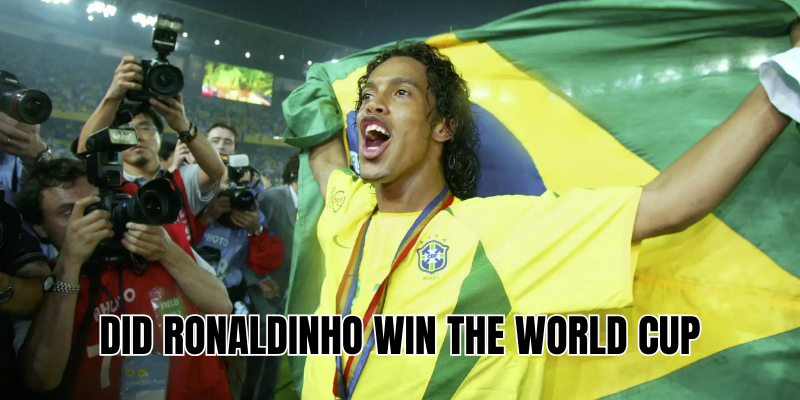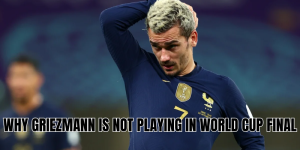From dazzling dribbles to gravity-defying free kicks, Ronaldinho’s name is woven into football folklore. But amidst all the flashes and flair, a question often lingers: did Ronaldinho win the World Cup? This isn’t just trivia—it tells us whether one of football’s most joyful geniuses ever reached the sport’s ultimate summit. In this article, AnaGoal will guide you through the full story: his role with Brazil, the 2002 campaign, what happened in 2006, and how his legacy shines whether or not he held that coveted trophy.
The Rise Of Ronaldinho And Brazil’s Ambitions
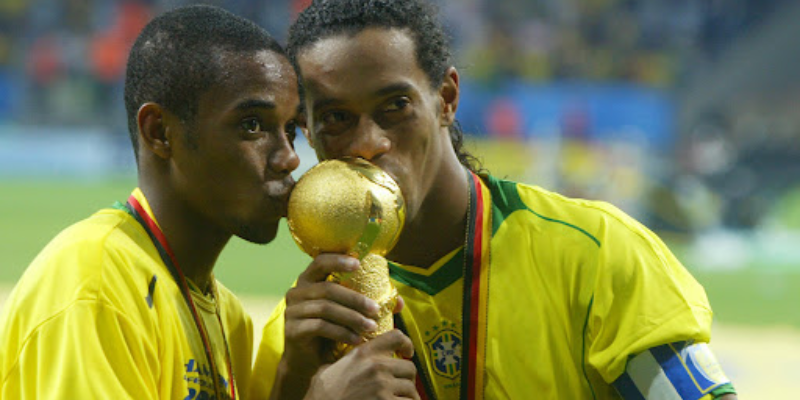
Ronaldinho — full name Ronaldo de Assis Moreira — emerged, and magician’s touch. He burst onto the Brazil scene in the late 1990s, quickly establishing himself as a national icon. Over time he would adorn his trophy cabinet with:
- La Liga titles
- A UEFA Champions League
- Copa Libertadores
- Copa América
- Confederations Cup
- Individual awards like the Ballon d’Or
Yet among those honors, the question of a World Cup trophy remained the most alluring.
Brazil, meanwhile, had long carried lofty expectations. Five-time champions by 2002, the Seleção always entered World Cups as favorites. But even for them, the path wasn’t guaranteed — knockout rounds, pressure, injuries, form swings all could derail dreams. Ronaldinho’s arrival brought optimism: could his creativity, unpredictability, and brio be the missing spark?
Ronaldinho’s Campaign In 2002: Yes, He Won
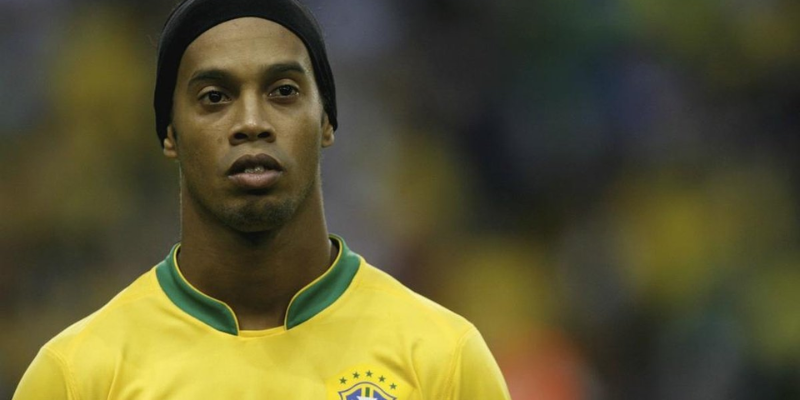
The direct answer to did Ronaldinho win the World Cup is yes — he was part of Brazil’s 2002 winning squad and made meaningful contributions along the way.
Entry into the Squad & Playing Time
In the 2002 tournament co-hosted by South Korea and Japan, Ronaldinho was one of the creative weapons in Scolari’s attacking setup, alongside Ronaldo and Rivaldo. He played in five matches across the tournament and scored two goals.
Though he did not start every game, his presence was felt: he combined flair with calculated risk, and even when he made mistakes or faced challenges, his influence registered.
Key Moments And Signature Performances
One of Ronaldinho’s most unforgettable contributions came in the quarterfinal vs England. The match was tight, and England took an early lead. Just before halftime, Ronaldinho orchestrated a swift move from deep — ghosting past defenders, linking up with Rivaldo, and leveling the game. Brazil eventually won 2–1.
However, the drama didn’t stop there: he was shown a red card during that same quarterfinal, forcing him to miss the semifinal. But upon Brazil’s advance, he was reinstated for the final.
In the final, Brazil beat Germany 2–0 to capture their fifth World Cup. Though Ronaldinho wasn’t the match’s central figure, he was part of the squad that lifted the trophy — a moment etched in his legacy.
Thus, for 2002, the answer is clear: yes, Ronaldinho won the World Cup — once.
What About 2006? The Second Shot
Ronaldinho also featured in Brazil’s 2006 World Cup campaign. But that tournament would not bring him another title.
- He played in matches, but Brazil were ousted in the quarterfinals by France (0–1)
- His influence was limited; as the tournament progressed, he was unable to match the consistency or dominance of earlier years.
Thus, unlike in 2002, there was no second World Cup to his name.
The Significance: What Winning Meant For Dinho
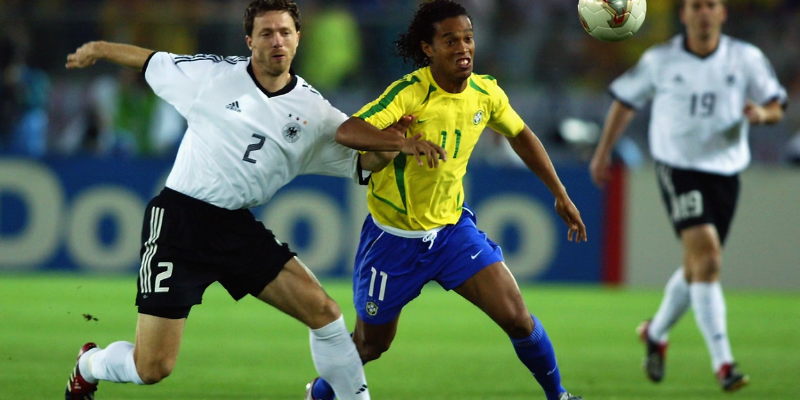
Why does it matter that Ronaldinho won (or didn’t win) the World Cup? Because for many players, that trophy symbolizes immortality.
Cementing Legacy
By becoming a World Cup winner, Ronaldinho:
- Joined the ranks of Brazilian legends who succeeded on the biggest stage
- Added a diamond to an already glittering career
- Proved his brilliance could translate at national team level
Even though he had individual flair and club success, having that world title gave him the completion many football fans crave.
Myths, Debates & Misconceptions
Despite the fact that Ronaldinho officially won in 2002, confusion sometimes arises — some fans assume (incorrectly) that he never did, or that his role was purely symbolic. But records clearly show he played and scored.
Additionally, Ronaldinho’s flamboyant style sometimes overshadows the grit and sacrifice behind the scenes — but his trajectory in 2002 was no fluke.
Statistics & Records: Ronaldinho In World Cups
To grasp the full picture beyond the “did Ronaldinho win the World Cup” question, here are the relevant stats:
| Item | Value |
| World Cups played | 2 (2002, 2006) |
| Total World Cup matches played | 10 matches |
| Goals scored in World Cups | 2 (both in 2002) |
| World Cup titles | 1 (2002) |
| Notable honors | Included in 2002 FIFA World Cup All-Star Team |
These numbers confirm the win, but also show that Ronaldinho’s World Cup impact was strong for that one edition — not across a prolonged World Cup dynasty.
How His World Cup Win Shapes His Mythos
In the pantheon of football greats, the World Cup often acts as a final judge. Ronaldinho’s win in 2002 gives him a badge few talents share: he wasn’t just spectacular — he was essential.
- His goals, assists, and moments of daring added layers to Brazil’s march
- His presence in the squad elevated its creative core
- Even his setbacks (like the red card) tell a story of risk, passion, and uncertainty
Without the trophy, many would still revere Ronaldinho purely for his genius. With it, he transcends “great entertainer” and becomes “champion.” It’s part of what makes his name inseparable from football lore — and what fans still debate and celebrate.
Final Thoughts
Did Ronaldinho win the World Cup? Absolutely — he was a part of Brazil’s 2002 triumph and made his mark with goals, creativity, and character. That single World Cup win is a crowning achievement in a career already laden with glory.
Here’s what you should take away:
- Ronaldinho played five matches in 2002, scored two goals, and contributed to Brazil’s path to glory
- He also participated in 2006, but that campaign ended in disappointment
- His status as a World Cup winner cements his legacy not just as a magical artist, but as a champion
If you enjoyed this breakdown and want to dive into match-by-match analysis, comparisons with other Brazilian legends (like Zico, Rivaldo, Romário), or how his club triumphs stack up — just say the word. AnaGoal is here to keep fueling your football curiosity.
